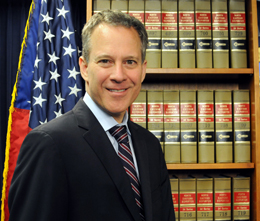
A.G. Schneiderman Promotes High School Initiative To Combat Grandparent Scam
Attorney General’s “Grandkids Against The Grandparent Scam” Teaches High School Students How To Warn Their Parents And Grandparents About Insidious Scam
Schneiderman: This Intergenerational Program Will Help Protect New York Families From Scams
State Attorney General Eric T. Schneiderman today announced that his office is launching a program, titled “Grandkids Against The Grandparent Scam,” to help prevent unsuspecting seniors from being victimized by this all-too common scam. The initiative, which includes a new and easy-to-read brochure, aims at empowering students to talk to their grandparents about the swindle. The program and brochure are being introduced at Ossining High School today.
“My office will use every tool at our disposal to protect senior citizens from this scam – which is used by con artists and criminals to steal cash from unsuspecting seniors and which leaves them frightened about the welfare of their grandchildren,” Attorney General Schneiderman said. “This intergenerational program represents a new and innovative approach to giving our older adults the information they need to avoid becoming victims.”
The program provides high school students with specifics about how the so-called “grandparent scam” works and an informational brochure to share with their parents and grandparents. It will be introduced at Ossining High School by Attorney General Schneiderman’s statewide elder abuse coordinator, Gary Brown, who is speaking to four classes of seniors about this scam and will distribute the pamphlet and a script for students to better understand the scam. The Attorney General’s Office will make the brochure and script available to schools that request the materials, which are also available online.
Among other tips, the brochure offers students a script to warn their grandparents about this dangerous scam: “When I go off to college, someone may call you and pretend to be me. The caller will say he’s in trouble and needs you to wire money fast. He’ll ask you to keep it a secret, and to not say anything to my parents. This is a scam. Don’t fall for it.”
The swindle works like this: A senior receives an unexpected call from someone who claims to be their grandchild. The caller says there is an emergency and asks the grandparent to wire money immediately. For example, the caller might say, "I’m in Canada and I’m trying to get home but my car broke down and I need money right away to get it fixed.” Or they may claim to have been mugged, or to have been in a car accident, or to have been arrested and need money for bail. The caller may also pose as an attorney or a law enforcement official contacting the grandparent on behalf of a grandchild.
The scammers gather information about potential victims - - including the names of their grandchildren - - from a variety of sources including the Internet and lists that are sold on the black market. If the scammer doesn’t know the name of the grandchild he is impersonating, he may say “Hi grandma, it’s your favorite grandson,” hoping that she will reply, “David, is that you?” The scammer will then say “Yes!” Often these crooks call in the middle of the night to take advantage of the fact that the victim may not be alert enough to ask more questions, and that the victim may not want to disturb other family members by calling them to confirm the information.
The grandparent scam tends to increase in frequency during school holiday breaks and during the summer, when it is especially believable that a grandchild would be travelling.Tips to protect against the grandparent scam:
- Be suspicious of anyone who calls unexpectedly asking you to wire money.
- Verify any supposed emergency, by calling friends and family, before wiring money.
- Develop a secret code or "password" with family members that can be used to verify a true emergency.
- Limit personal information, such as vacation plans, shared on social media sites.
The Federal Trade Commission recorded more than 40,000 incidents of grandparent scams from 2010 to 2013. The scam is widely considered to be underreported.
The initiative is being directed by Gary S. Brown, who is the Attorney General’s Statewide Elder Abuse Coordinator and also the Assistant Attorney General-in-Charge of the Westchester Regional Office. Martin J. Mack is the Executive Deputy Attorney General for Regional Affairs.